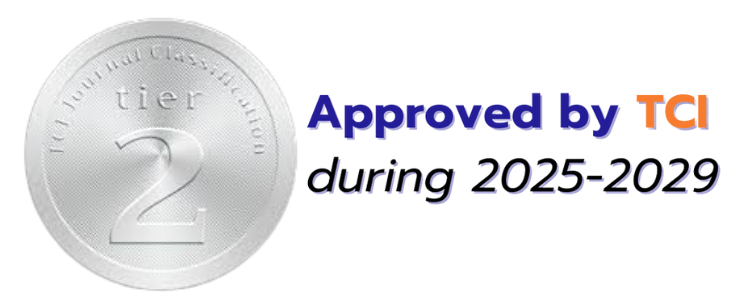การพัฒนามโนมติของนักเรียนชั้นมัธยมศึกษาปีที่ 1 เรื่อง ความร้อนกับการเปลี่ยนแปลงของสสาร ด้วยเทคนิคสถานการณ์จำลอง|Development of Seventh Grade Students' Concepts of Heat and Changing State of Matter through a Simulation Technique
关键词:
มโนมติ, การจัดการเรียนรู้ที่เน้นแบบจำลองสถานการณ์, ความร้อนกับการเปลี่ยนแปลงของสสาร, conceptions, simulation-based approach, heat and changes of state摘要
การวิจัยครั้งนี้มีจุดประสงค์เพื่อ 1) ศึกษาระดับมโนมติของนักเรียนชั้นมัธยมศึกษาปีที่ 1 เรื่อง ความร้อนกับการเปลี่ยนแปลงของสสาร ก่อนเรียนและหลังเรียน และ 2) ศึกษาความพึงพอใจของนักเรียนที่มีต่อการจัดการเรียนรู้ด้วยเทคนิคสถานการณ์จำลอง ผู้เข้าร่วมวิจัยเป็นนักเรียนระดับชั้นมัธยมศึกษาปีที่ 1 จำนวน 38 คนจากโรงเรียนมัธยมศึกษาขนาดใหญ่ รูปแบบการวิจัยที่ใช้ คือ วิจัยแบบกลุ่มเดียววัดผลก่อนและหลัง เครื่องมือที่ใช้ในการวิจัย ได้แก่ แบบทดสอบความเข้าใจมโนมติ เรื่อง ความร้อนกับการเปลี่ยนแปลงของสสาร ซึ่งเป็นแบบปรนัยชนิด 4 ตัวเลือก 2 ลำดับขั้น (ค่าความเชื่อมั่นเท่ากับ 0.87) และ แบบสอบถามความพึงพอใจแบบอัตราส่วนประมาณค่า ข้อมูลที่รวบรวมได้นำมาวิเคราะห์โดยใช้เกณฑ์การให้คะแนนมโนมติทางวิทยาศาสตร์ 5 ระดับ และเปรียบเทียบร้อยละตามระดับความเข้าใจในแนวคิดก่อนและหลังการเรียนรู้ ผลการวิจัยพบว่า จำนวนนักเรียนที่มีแนวคิดที่ถูกต้องเกี่ยวกับการเปลี่ยนแปลงทางกายภาพและการเปลี่ยนแปลงทางเคมี การเปลี่ยนแปลงสถานะของสสารคิด และการเปลี่ยนแปลงของอนุภาคเมื่อได้รับหรือสูญเสียความร้อน คิดเป็นร้อยละ 63.16, 47.37 และ57.90 ตามลำดับ ซึ่งสะท้อนให้เห็นว่า เทคนิคสถานการณ์จำลองสามารถส่งเสริมมโนมติ เรื่อง ความร้อนกับการเปลี่ยนแปลงของสสาร และนักเรียนมีความพึงพอใจต่อการจัดการเรียนรู้ด้วยเทคนิคสถานการณ์จำลองอยู่ในระดับมาก
This research aimed to 1) compare students’ concept level of heat and changes of state before and after learning through a simulation technique and 2) explore students’ satisfactions to the simulation technique. The research participants was 38 seven grade students from a large size-high school. The research design is one-group pretest-posttest design. The research instruments consisted of 1) a heat and changes of state concept test with five two-tier multiple-choice questions (reliability = 0.87) and 2) a student satisfaction questionnaire with five Likert-scale items. The data were analyzed through general rubric of 5 levels of scientific conceptions and percentage of each level were compared before and after learning with the simulation technique. The results revealed that after learning the number of students who held the correct concepts about physical and chemical change, state changes and molecule change were higher than before learning at 63.16%, 47.37%, and 57.90%, respectively. Therefore, teaching by using the simulation could help improve students’ understanding of heat and changing state of matter. The students also possessed a high level of satisfaction towards the simulation teaching technique.







